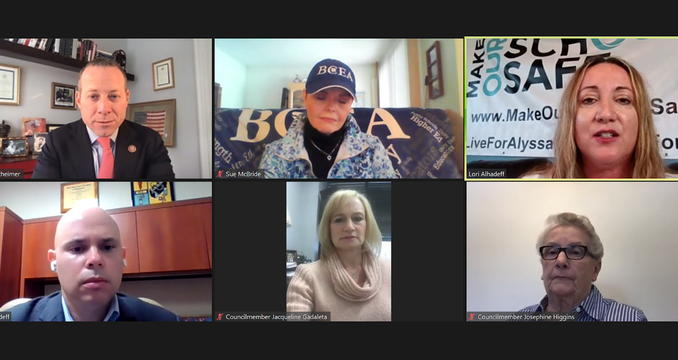
PASCACK VALLEY AREA, N.J.—U.S. Congressman Josh Gottheimer (NJ-5) joined the parents of Alyssa Alhadeff—a Woodcliff Lake native who lost her life in the tragic shooting at Marjory Stoneman Douglas High School in Parkland, Fla., in 2018, three years ago last weekend—to announce the bipartisan Alyssa’s Legacy Youth in School Safety Alert Act (the ALYSSA Act).
The ALYSSA Act is bipartisan federal legislation to require silent panic alarms in all schools to immediately alert law enforcement of an active shooter situation.
The bill will also increase investment in more well-trained School Resource Officers, to help protect students and faculty.
The Alhadeff family originally lived in Woodcliff Lake, in the Fifth Congressional District, before moving to Parkland.
“We are here today to honor Alyssa and turn her memory, and the pain her family and friends carry every day, into action. We are here to announce bipartisan legislation—the ALYSSA Act—to help protect children, like Alyssa, and all students, in the one public place they should feel safest: their schools,” said Gottheimer.
He added, “Together, with silent alarms in every school directly connected to local law enforcement agencies and with School Resource Officers at more schools around the country, we are taking concrete steps to help further protect our children in their schools.”
Lori Alhadeff, the mother of Alyssa Alhadeff and co-founder of Make Our Schools Safe, said “In a life threatening emergency situation, seconds count. The ALYSSA Act will save lives by empowering our teachers to push a button that is directly linked to law enforcement. The ALYSSA Act needs to be an equitable, standard level of school safety protection in every school around the country. This is a movement and together we will Make Our Schools Safe!”
Bergen County Education Association President Sue McBride said, “The members of the Bergen County Education Association wholeheartedly thank Congressman Gottheimer for taking the lead in Washington on an issue that is so critical to the safety of our students and our school employees.”
She added, “These silent alarms will assuredly save lives. We are proud to stand with him, offering our full support.”
Gottheimer and the Alhadeffs made the announcement together on Feb. 12, with McBride, and Woodcliff Lake Councilmembers Jacqueline Gadaleta and Josephine Higgins.
In February 2019, the State of New Jersey signed legislation into law—championed by the Alhadeffs—to require all New Jersey public schools to install silent panic alarms that can be activated in case of an active-shooter situation.
The announcement of the ALYSSA Act will bring that requirement to all 98,000 public schools nationwide, and will cut federal red-tape to create specially-designated investment in bringing trained School Resource Officers to more schools.
According to the most recent data from the National Center for Education Statistics, only 29% of schools report using silent alarms that are directly connected to local law enforcement.
The bipartisan ALYSSA Act includes the following provisions:
Silent Panic Alarms
This bill will bring the same requirements enshrined in New Jersey’s Alyssa’s Law to all public schools nationwide.
There are more than 98,000 public schools in the United States and, under this legislation, all that receive federal funding under Title I of the Elementary and Secondary Education Act (ESEA) will be required to install silent alarms, which can average $1,000 per school.
These silent alarms are utilized by schools in the case of an emergency such as a lockdown or active-shooter situation. When activated, the alarms remain silent in the building and alert local law enforcement to the emergency via a signal or message.
School Resource Officers
Going a step further, this bill will also ensure every school has access to School Resource Officers (SROs).
Currently, grants for SROs are available under the Community Oriented Policing Services (COPS) program. However, there is no guaranteed funding stream to bring SROs to every school nationwide.
This legislation will cut federal red-tape to provide for specially-designated investment in bringing trained SROs to all schools, without having to meet additional complicated and changing standards from the U.S. Department of Justice.
